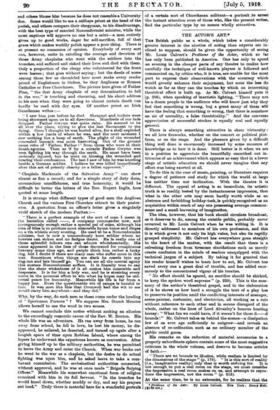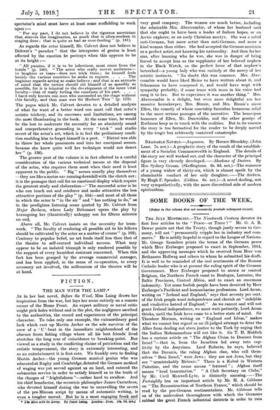THE ACTOR'S ART.* Tea British public as a whole, which
takes a considerably greater interest in the niceties of acting than experts are inclined to suppose, should be given the opportunity of seeing Mr. Louis Oalvert's Problems of the Actor, which so far has only been published in America. One has only to spend an evening in the cheaper parts of any theatre to realize how carefully the technique of well-known players is followed and commented on, by critics who, it is true, are unable for the most part to express their observations with the accuracy which would greatly enhance their enjoyment, but none the less do watch as far as they can the touches by which an interesting theatrical effect is built up. As Mr. Calvert himself puts it (p. 206), when speaking of inartistic lighting, "There may not be a dozen people in the audience who will know just why they feel that something is wrong, but a great many of them will have the feeling that something is wrong, that there is somehow an air of unreality, a false theatricality." And the converse appreciation of successful strokes is equally real and equally general.
There is always something attractive in sheer virtuosity : we all love fireworks, whether on the concert or political platform, or on the stage. And the pleasure given by a difficult thing well done is enormously increased by some measure of knowledge as to how it is done. Still better is it when we are in a position to appreciate the beautifully smoothed out intricacies of an achievement which appears so easy that in a lower stage of artistic education we should never imagine that any effort was being exerted at all.
To do this in the ease of music, painting, or literature requires a degree of patience and study for which the world at large has neither time nor inclination. With the theatre it is different. The appeal of acting is so immediate, its artistic truth is so readily tested by the instantaneous impression, that what in the other arts may seem hardly worth while as an abstruse and forbidding holiday-task, Is quickly recognized as an acquisition within reach of any one possessing average commonsense and a small leavening of imagination.
The idea, however, that his book should circulate broadcast, as it deserves to do, among the outside public, probably never occurred to Mr. Louis Calvert when he was writing it. It is directly addressed to members of his own profession, and this it is which gives it not only Its high value, but also its rapidly grasped simplicity. Mr. Calvert has everywhere gone straight to the heart of the matter, with the result that there is a refreshing freedom from tiresome elucidations such as merely create confusion in the minds of readers unequipped with the technical jargon of a subject. By taking it for granted that his reader himself wishes to learn how to act, Mr. Calvert has saved every one a great deal of trouble, and has added enormously to the concentrated vigour of his treatise.
"No effort should be spared, no sacrifice should be shirked, to keep the spoken word supreme" (p. 220). This is the summary of the author's theatrical gospel, and in the elaboration of it he shows us how hard a struggle the text of a play has to preserve its position amid the conflicting interests of manager, scene-painter, costumier, and electrician, all working as a rule without reference to each other and in serene disregard of the whole, rather on the lines of Lord Alvanley's famous hunting heresy: "What fun we could have, if it weren't for these d—d hounds !" Mr. Calvert takes us behind the scenes—a dissipation few of us ever age sufficiently to outgrow—and reveals an absence of co-ordination such as no ordinary member of the public could guests.
His remarks on the reduction of material accessories to a properly subordinate sphere Contain some of the most suggestive criticism in the whole volume, and deserve to become articles of faith :— " There are no bounds to illusion, while realism is limited by the dimensions of the stage" (p. 178). "It is this sort of reality [i.e., imaginative reality] only that is worth striving for. It is not enough to put a real room on the stage, we must consider the impression a real room makes on us, and attempt to reproduce the impression, not the room" (p. 212).
At the same time, he is no extremist, for he realises that the spectator's mind must have at least some scaffolding to work upon :— "For my part. I do not believe in the rigorous asceticism that starves the imagination, as much that is ultra-modern in staging does : that is quite as bad as over-feeding" (p. 181).
As regards the actor himself, Mr. Calvert does not believe in Diderot's " paradox " that the interpreter of genius is least affected by the emotion he portrays when this appears to be at its height :— " All passion, if it is to be infectious, must come from the inside" (p. 160). "The actor who really moves audiences— to laughter or tears—does not trick them ; he himself feels keenly the various emotions he seeks to express. . . . The beginner regards acting as make-believe : and that is an attitude of mind that the novice should rid himself of as speedily as possible, for it is inimical to the development of the more vital faculty—that of really feeling the emotions of his part. . . . I have only known one man who succeeded on the stage without this faculty, and that man was Sir Herbert Tree" (p. 123).
The pages which Mr. Calvert devotes to a detailed analysis of what for want of a better word one must call that actor's artistic trickery, and its successes and limitations, are among the most illuminating in the book. At the same time, he would be the last to underrate the necessity for an absolutely sound and comprehensive grounding in every " trick " and studio secret of the actor's art, which is in fact the preliminary condition enabling him to forget himself in a part. " Ristori was able to throw her whole passionate soul into her emotional scenes, because she knew quite well her technique would not desert her" (p. 136).
The greater part of the volume is in fact allotted to a careful consideration of the various technical means at the disposal of the actor, who requires them most when their need is least apparent to the public. " Big " scenes usually play themselves —they are like a motor-car running downhill with the clutch out: it is the passages that call for no emotional display which require the greatest study and elaboration—" The successful actor is he who can touch out and reinforce and make attractive the less attractive portions of the play" (p. 104)—and most of all those in which the actor Is "in the air" and "has nothing to do," as
in the prodigious listening scene quoted by Mr. Calvert from Major Barbara, where Lady Britomart opens the play by haranguing her (theatrically) unhappy son for fifteen minutes
on end.
Above all, Mr. Calvert insists on the necessity for teamwork. "The faculty of rendering all possible aid to his fellows should be cultivated by the actor as a matter of course" (p. 102). Contrary to popular belief, no art lends itself less than that of the theatre to self-centred individual success. What may appear to be an isolated triumph is only rendered possible by the support of every humblest assistant concerned. When this fact has been grasped by the average commercial manager, and has been applied, in the sense of co-operation, to every accessory art involved, the millennium of the theatre will be at hand.















































 Previous page
Previous page